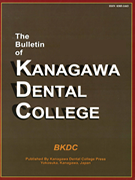- HOME
- > 一般の方
- > バックナンバー:The Bulletin of Kanagawa Dental College
- > 37巻1号
- > アブストラクト
アブストラクト(37巻1号:The Bulletin of Kanagawa Dental College)

English
| Title : | Mandibular Displacement, an fMRI Study |
|---|---|
| Subtitle : | BKDC CLINICAL AND RESEARCH TOPICS: Stomatognathic System and Occlusion Medicine |
| Authors : | Takero Otsuka, Shinjiro Miyake, Kenichi Sasaguri, Minoru Onozuka*, Sadao Sato |
| Authors(kana) : | |
| Organization : | Departments of Craniofacial Growth and Development Dentistry, Kanagawa Dental College, *Departments of Physiology and Neuroscience, Kanagawa Dental College |
| Journal : | The Bulletin of Kanagawa Dental College |
| Volume : | 37 |
| Number : | 1 |
| Page : | 61-64 |
| Year/Month : | 2009 / 3 |
| Article : | Report |
| Publisher : | Kanagawa Odontological Society |
| Abstract : | [Abstract] Using functional magnetic resonance imaging (fMRI) in eight healthy human subjects, blood oxygenation level-dependent (BOLD) signals were measured during clenching, in a malocclusion model using a custom-made splint that forced the mandible into a retrusive position, and an unmodified splint as a control. These results were compared to the BOLD signals during the corresponding rest conditions. The individual visual analog scale (VAS) score was also examined during clenching in order to evaluate the interactions between the fMRI data and the psychiatric changes. Activity was observed in four brain regions (premotor cortex, prefrontal cortex, sensory-motor cortex, and insula) in both clenching sessions. However, the clenching in the malocclusion model, including psychological discomfort, further increased the BOLD signals in the anterior cingulate cortex and the amygdala. In addition to this, there was a parallel relationship between the BOLD signal intensities and the VAS scores in these two regions. The findings may suggest the involvement of clenching with malocclusal conditions in emotion and/or pain-related neural processing in the brain. |
| Practice : | Dentistry |
| Keywords : |
